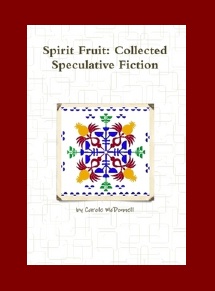Exploring Reality
Introduction
Carole McDonnell is a writer of fiction, devotionals, and essays. Her Christian, speculative fiction, and multicultural stories appear in various anthologies, and her reviews appear in print and at various online sites. She lives in the Hudson Valley with her husband and two sons. Her fantasy romance novel, Wind Follower and her Bible Study, Seeds of Bible Study are both available online at Amazon and Barnes and Noble. Follow Carole at her blog, YouTube, Twitter, or Facebook.
– – – – –
I have spoken to you of earthly things and you do not believe; how then will you believe if I speak of heavenly things? John 3:12
I tend to avoid Christian mainstream fiction for two basic reasons. The first: they often preach the law. Yes, even when they are trying to preach the gospel or—better yet—the kingdom of God, I inevitably feel as if I have been shown yet again why the Ten Commandments are the right way to go. It often seems to me that while Christianity is about showing the world the tree of life, many writers end up bringing their readers to the tree of knowledge of good and evil.
The second reason concerns me as a lover of fantasy.
With the exception of an answered prayer or the odd spiritual coincidence, much mainstream Christian fiction allows little entry to the supernatural.
 But fantasy does. Every writer, religious or not, has a worldview. We see the world emotionally, spiritually, socially, politically. But a Christian fantasy writer wants to show that Earth and the universe have spiritual supernatural laws that affect humans, non-human, or non-terrestrial characters. For us, Christianity is not only about semantics/doctrine/rules. We understand that the world is magical, that the Christian sacraments are not only about obeying rules but that they have an affect on both unseen and seen matter and entities, and that doctrines are really keys to power. In short, we take Bible verses seriously as starting points to our stories.
But fantasy does. Every writer, religious or not, has a worldview. We see the world emotionally, spiritually, socially, politically. But a Christian fantasy writer wants to show that Earth and the universe have spiritual supernatural laws that affect humans, non-human, or non-terrestrial characters. For us, Christianity is not only about semantics/doctrine/rules. We understand that the world is magical, that the Christian sacraments are not only about obeying rules but that they have an affect on both unseen and seen matter and entities, and that doctrines are really keys to power. In short, we take Bible verses seriously as starting points to our stories.
The exploration of the supernatural is problematic because some Christians actively live de facto in a closed universe and they pooh-pooh the supernatural, thinking the supernatural unenlightened or irrational. Others hate the word “supernatural.” And still others fear it.
In addition, non-Christian writers also explore the supernatural and there is often an overlap. The Bible has given us all God’s revealed truth about sin, mankind, evil, and the devil. But other cultures also have some glimpse of the truth. Thus, the Greeks can write about family generational curses, or the writers of the Matrix can depict a world within a world, or a group of rationalistic scientists can declare that the universe is a simulation.
The Biblical fact is this: Jesus said “I have spoken to you of earthly things and you do not believe; how then will you believe if I speak of heavenly things?” John 3:12
There are earthly truths that are so untenable to our human minds, so high and unattainable to our human intellect, that we simply do not believe them. And the Bible is full of verses that open a window on what real reality—or heavenly things—might be. And these verses can also be used as seeds for stories.
A fantasy writer could take the concept of Jesus being the Word of God and create a novel where the world is made up of people and their doubles born from their spoken words. Another could look at the verse, “God’s word is active and powerful” and create a world where words have a life of their own. Yet another writer could look at the verse, “The stones will cry out” and can build a whole universe where stones and matter can react to the emotions around them.
All these possible stories have this in common: they would bring us nearer to the Truth. Poets, madmen, inventors, and visionaries are often linked together.
![windfollower2[1]](http://www.speculativefaith.lorehaven.com/wp-content/uploads/2013/03/windfollower21-210x300.jpg) When considering a theological doctrine or a religious activity such as the “laying on of hands,” a Christian fantasy writer could invent a story about some force or invisible “substance” within each person (and especially within Christians) that can be passed from one person to another. Or he/she might create a story based on the tower of Babel where an invention is made that suddenly changes the communication and language centers of the brains or all humans on earth. Are all believers really in God and in each other as Jesus said in His high-priestly prayer? A Christian fantasy writer could explore this truth by creating such a world.
When considering a theological doctrine or a religious activity such as the “laying on of hands,” a Christian fantasy writer could invent a story about some force or invisible “substance” within each person (and especially within Christians) that can be passed from one person to another. Or he/she might create a story based on the tower of Babel where an invention is made that suddenly changes the communication and language centers of the brains or all humans on earth. Are all believers really in God and in each other as Jesus said in His high-priestly prayer? A Christian fantasy writer could explore this truth by creating such a world.
How magical is this world? And how magical is it intended to be? And how powerful could we Christians be if we took some of the stranger (seemingly metaphorical) verses literally? Christian fantasy writers explore this.
Throughout the Bible, we humans are encouraged to ask God to open our eyes and to use our imagination to understand the knowledge, the height, width, depth, length of God’s power working in us who believe in Christ. A good Christian fantasy is like a good sermon. Not because it preaches at us but because it opens our eyes to the godly, the numinous, the weird, the magical, the banal, and this marvelous light God has called us to.































Great post–thank you.
Thanks so much, Sherwood!
A few weeks ago on Mike Duran’s blog, he chronicled what happened to the writer of Soul Gate (essentially a novel that is the Christian Inception). Apparently the Amazon reviewers went berserko because the author (in the story) equated the work of the Holy Spirit with magic. He explains in the author notes that he doesn’t really believe this (it was, you know, FICTION).
But this article reminded me of that particular fight. I personally think anything we can’t explain or understand should be considered “magic” (quantum physics, anyone?). But Christians in particular are extremely threatened by that view. I think it’s why they’re so suspicious of fantasy as a rule.
I so wish there was another word for “magic” …other than…ya know…”magic.” The word magic is so linked in our minds with evil and with people trying to control others and with the demonic. Not sure if “supernatural” is a better word, though. I agree the word “magical” should really not be used with the work of the Holy Spirit. “Magical” seems so cheap. But alas, that’s the only word one can come up with.
As for that author…I so wish he hadn’t said he didn’t “believe” that. The time is coming when mere doctrine is not going to convince anyone about the truth of the Christian religion. Paul didn’t convince his hearers through philosophy but with power. And there is so much power in Christianity and in prayer if we could have a childlike belief in the power of imagination and of faith and of the spoken word. We Christians have so much favor and authority through Christ.
Clarke’s third law comes into play here, but I also think we just need to admit there are some time we can’t explain through our scientific knowledge but that doesn’t make them good or bad–just inexplicable.
A well-articulated post that offers some provocative thoughts on the ongoing issue of “magic” in fantasy. I linked to this on my Facebook profile.
Personally, “magic” was always a taboo word in my house. My mother loved science fiction and so I was raised on Star Trek, Star Wars, and other space universes. It was only as I grew older that I realized this “science” fiction operated on the principles of “magic” (ie, inexplicable something that makes something else work) just the same as any elf (or Vulcan, in Star Trek) or enchanted sword (or lightsaber, if you prefer) from a typical fantasy novel.
However, magic is so strongly connected with evil (including in usages within the Bible, as well as modern-day shamans and the like) that it’s hard to avoid that negative connotation in writing.
What other word can we used for the inexplicable? The undefinable? That which, in the real world, can only point to a mighty Creator involved in sustaining every part of His creation?
By the way, I love the idea of a world where the stones react to emotion!
Good stuff. Fred Warren, me, you, Mike Duran all seem to be posting on this topic as of late. And others. Who’s not listening?! lol 🙂
Thank you, Rebecca, for inviting me to post. Thanks to all the readers for your kind words.